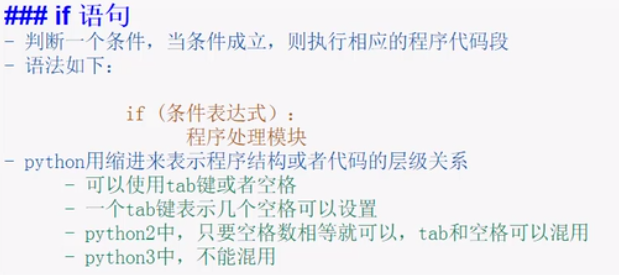-----------------以下截图来自王大鹏老师的教学

if (3 < 89): print("True") # 假如3小于89,则打印字符串“True” if (3 < 9): pass # pass语句,占位符号,不执行任何语句,不起任何实际作用
#V1.0 有逻辑问题,跟业务期望不一致 score = 87 if (score >= 90): print("A") if (score >= 80 ): print("B") if (score >= 70 ): print("C") if (score >= 60 ): print("D") if (score < 60): print("E") #V2.0 初级if语句,主要是理解思路,但是不是标准程序员的写作格式 score = 87 if (score >= 90): print("A") if (score >= 80 and score<90): print("B") if (score >= 70 and score<80): print("C") if (score >= 60 and score<70): print("D") if (score < 60): print("E")

简单的练习:判断是否及格
score = input("请输入你的成绩:") # input返回的是string类型,不能直接跟整数比较 score = int(score) # 通过int对象可以把字符串类型转换成整数数字类型 if (score >= 60): print("你已经及格!") else: print("对不起,你需要重考!")
增加业务需求:能够判断好成绩,及格和不及格
score = input("请输入你的成绩:") score = int(score) # 通过int对象可以把字符串类型转换成整数数字类型 if (score >= 90): print("A") print("You are the best!") print("Thank You!") else: if (score >= 60): print("成绩及格") else: print("成绩不及格")

score = 87 if (score > 90): if (score >= 95): print("You are the best!") else: print("一般般啦")
练习;模拟上海出租车收费系统
1. 3公里以内,13元;
2. 15公里以内,每公里2.3元;
3.超过15公里,加收空驶费,为单价的50%,即:2.3+2.3*0.5=3.45元
km = input("请输入里程数:") km = float(km) # float表示浮点数,即小数,里程可能是小数 cost = 0 if (km <= 3): cost = 13 print("费用是:{:,.1f}".format(cost)) else: if (km <= 15): cost = 13 + (km - 3) * 2.3 print("费用是:{:,.1f}".format(cost)) else: cost = 13 + 12 * 2.3 + (km - 15) * 3.45 print("费用是:{:,.1f}".format(cost))